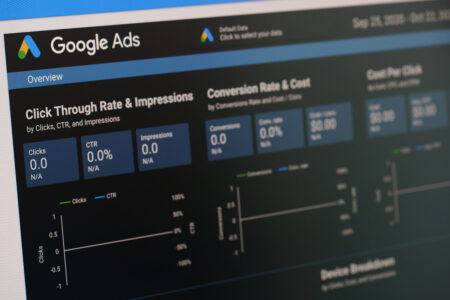It is always interesting to merge two industries that have no direct correlation, but allow me to do the honours – fashion & Search Engine Optimisation (SEO)!
At fashion week, all the fashion big wigs, bloggers, influencers, photographers etc, all come together in their best ‘gears’. Likewise, BrightonSEO promised to deliver the same energy with like-minded individuals spanning from:
- SEO specialists
- Marketing executives
- Web developers
- Paid experts
- Software engineers
The conference shares industry updates, tips and tricks to work smarter (hello automation), and of course to improve the quality of work delivered to clients.
It was obviously a no-brainer when I was asked to go to this very much anticipated event back in April. I may be a little late to the party, but I wanted to delve into what was discussed at the last conference and what we found particularly insightful.
So, without any further ado, let’s get straight into what this event means for search marketing and some key takeaways.
What is Brighton SEO?
BrightonSEO is a search marketing conference that takes place twice every year with attendees from all over the world. The conference comprises of speakers, exhibitors, and attendees all eager to learn what’s new in search, and of course, a great place for networking!
On the agenda was an array of talks, including but not limited to:
- On-Page SEO
- Content Marketing
- Crawling and Indexation
- Technical SEO
- Keyword Research
- Link Building
- Automation
- Migration & Relaunches
Catch your breath…
Indeed, there were enough inspirational talks for everyone, and you get to choose which talk resonates more with you.
On-Page SEO
As the name implies, on-page SEO focuses on everything that is within your website, referring to optimising what’s on your site to improve user experience and rankings. Unlike off-page SEO which focuses on everything outside your site such as backlinks, brand mentions or social media influence.
When we merge both on-page & off-page SEO, then we are well on our way to ranking on the Search Engine Results Pages (SERP).
It all sounds straightforward, right? Well, not quite and here is why.
As SEOers, it can be frustrating when you have followed the list of things to do but are still not quite there in terms of rankings. We circled down to three key takeaways:
Full Scope of Title Rewrites
When we talk about on-page, we also need to put into perspective keyword research, which then boils down to what keywords should be prioritised in the meta titles. Let’s not get carried away by search volumes either, because we know too well that the data on SERP speaks! And if anything isn’t clear up to this point, SERP data must be relevant to the content on the site.
So, with this knowledge in mind, how do we tackle meta title rewrites? This is not a rhetorical question, so we will answer it immediately. We tackle meta title rewrites by putting useful information first. The reason is Google, one of its recent updates now chooses to rewrite the title displayed on SERPs to match the content. So, it was always about relevancy, and that hasn’t changed.
Understanding Entity Search
The question on everyone’s lips is “how do we make content discoverable?”. But just before we sink our teeth into this one, there’s just one thing we need to say louder for the people at the back – search does not change, but a consumer problem does. Ok, now that we have established that fact, how do we make content visible to our target audience?
For content to be successful, we must overcome three main obstacles:
- The what (topics)
- The why (intent)
- The how (entities)
Search engines do not solely focus on keywords to rank, they also focus on semantics, which are related words used in the content to provide users with the most relevant answer to their query.
Gap Analysis
It is very important to know who your competitors are and what they are doing. Often, clients know their competitors, but not all clients know who their SERP competitors are – you can use tools such as SEMrush or Sistrix to find out. Once this is established, understanding where the gap is, in terms of keywords would help you drill down and understand the right tactics to take.
Technical SEO
The ultimate dream of SEOers is to be able to automate mundane tasks. What I found quite insightful here, is how to automate the technical SEO bits. Where we still spend hours on end verifying data on numerous excel spreadsheets, pulling position tracking reports and colour coding them, to still get errors in the report because we are humans, not robots; staring at a spreadsheet with lots of data can be strenuous for the eyes!
The key takeaway is you can automate anything by learning a programming language. Yes, there’s more to SEO, friends!
These are some examples of using automation in technical SEO, that I thought were beyond amazing:
- Using Robotic Process Automation (RPA) to scrape data from a website. Traditionally, we would manually do site command checks, or ‘CTRL F’ to search for data on a website. We have tools like Screaming Frog that makes this task less tedious, but automation using bots to perform mundane SEO tasks really takes the cake! If you had to remove every wrong spelling of a particular word across a huge website, imagine how much easier it would be to do with a bot!
- Eradicating 404 errors
- Scheduled Crawls
- Image Optimisation – this is especially important for page speed and the overall speed of a site. If image optimisation is automated, imagine how good your site performance would be, especially now that Core Web Vitals is a ranking factor.
Finally, the end of this conference took an interesting turn…
I am sure we could argue about this one, and perhaps agree to disagree: Strategy vs Tactics – which is more important?.
This topic I think is important for all companies, regardless of their niche. We know strategy as the plan that marketers put forward to tackle a problem and tactics as how they would overcome this problem. In the speaker’s words, “strategy is ‘Where am I going?’, and tactics is ‘How am I going to get there?’.
My personal take is that we dwell too much on strategy. Businesses can have a digital strategy, marketing strategy, and an e-commerce strategy (to name a few!), whereas we could also have digital tactics and the like.
Improve your search rankings
We are looking forward to attending the next BrightonSEO conference in October, but in the meantime, if you want to improve your rankings get in touch and speak to one of our friendly SEO experts.
Let's collaborate
Partner with us
Let’s work together to create smarter, more effective solutions for your business.
Related blogs
Who we are
Explore how our culture and expertise fuel digital innovation
Join us







